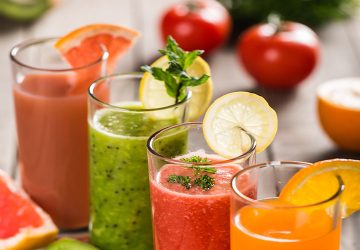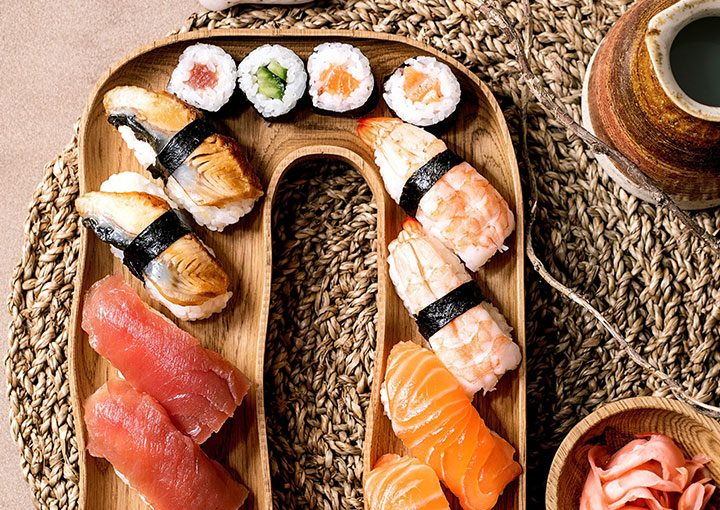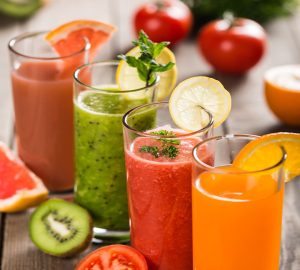[ad_1]
The Japanese diet can be a delicious, healthy, and delectable path to longevity. While the Japanese cuisine itself is a blend of culinary excellence full of subtle and umami flavors, it also focuses on healthy eating practices, with a strong emphasis on balance, portion control, and mindful eating. The nutrient-dense foods in this diet are purported to reduce the risk of cardiovascular diseases, improve digestion, and aid in weight loss. In this article, we have discussed how the Japanese diet works, listed foods to include in the diet, potential health benefits, associated risks, a sample diet plan, as well as some flavorful recipes. Read on!
 At A Glance: Japanese Diet
At A Glance: Japanese Diet- Principle: Focuses on the intake of fresh, seasonal, unprocessed, nutrient-dense foods.
- Purpose: To promote overall health and longevity.
- Who It Is For: People looking to start healthy eating habits.
- Duration: Long-term
- Who Should Avoid: People with sensitivity to sodium or irritable bowel syndrome (IBS).
- Cons: May cause nutrient deficiencies, food sensitivities, and eating disorders
What Is The Japanese Diet?
The Japanese diet is known for its low-calorie and high-nutrient foods. It is characterized by the consumption of whole foods rich in nutrients, such as soybean and fish, and minimal consumption of animal fat and meat. This traditional diet is also known as Washoku, which includes foods with umami flavor (generally described as the fifth taste). The Japanese diet focuses on consuming smaller, well-balanced meals multiple times throughout the day. This dietary pattern also prioritizes traditional Japanese cooking techniques, such as grilling and steaming to maximize the health benefits of the foods and using Japanese condiments to add flavor to the food rather than sauces or seasonings.
 Did You Know?
Did You Know?The Japanese diet gained popularity around the world for its potential health benefits in the latter half of the 20th century.
But how does this diet plan work to improve overall health and life expectancy? Scroll down to take a deeper look.
How Does The Japanese Diet Work?
“Let food be thy medicine and medicine be thy food” – Hippocrates
The foods you consume have a significant impact on your health and well-being. The Japanese diet has gained worldwide attention due to it being plant- and fish-based, and due to Japan’s relatively low rates of obesity and long life expectancy (1). While dietary preferences can differ among individuals and geographical locations, there are several key elements that are characteristic of Japanese eating habits and commonly linked to their diet. Here is how this diet works:
- The Japanese diet works by consuming high-quality, fresh, and unprocessed ingredients to give your body the essential nutrients to perform bodily functions.
- This cuisine strongly emphasizes incorporating seasonal ingredients, which are considered especially beneficial for your health.
- Traditional Japanese cooking techniques like steaming and grilling also minimize the use of unhealthy fats and oils, which may contribute to weight management and well-being.
- This popular diet focuses on portion control and eating small meals multiple times throughout the day, which helps prevent overeating.
Learn about the health benefits of the Japanese diet in the next section.
Benefits Of The Japanese Diet
1. Provides Essential Nutrients
Japanese diets are naturally rich in vitamins and minerals and are known for their nutrient density. The foods included in this diet are high in vitamins A, C, and E, dietary fibers, and minerals, like iron, potassium, calcium, and magnesium (2). This diet also includes fish and other seafood, which are rich in omega fats and other beneficial compounds that provide several health benefits (3). Lastly, if you look at a sample of the Japanese diet, you will notice how frequently foods like seaweed and green tea are included in it. These are rich in antioxidants, which help protect your body against free radical damagei XHarmful effects (heart disease, neurodegenerative disorders, age-related issues) caused by highly reactive and unstable molecules. (4), (5).
2. May Improve Digestion
Japanese cuisine includes fermented foods like natto and miso, which have potential benefits for digestive health. Miso is a traditional fermented seasoning that is made from soybeans and grains. The active enzymes in miso help aid in the digestion and absorption of vital nutrients and lower the risk of developing stomach issues (6). Natto is a fermented soybean dish that is replete with probioticsi XLive microorganisms found in fermented foods and dietary supplements, the consumption of which is beneficial for your health. and dietary fiber, which is believed to have a beneficial effect on intestinal regulation (7). In addition, foods included in this diet are also rich in fiber, which helps reduce the risk of constipation (8).
3. May Reduce The Risk Of Chronic Conditions
The Japanese diet majorly contains root vegetables, soy-based foods, seafood, and beverages like green tea that may help reduce inflammation and oxidative stress. These food groups are high in antioxidants and phytonutrientsi XNatural compounds that are found in many fruits and vegetables with health-promoting properties. and low in calories and glycemic value, which may protect you from type 2 diabetes, cancer, and other age-related health concerns (9). A study conducted at the Miyagi Cancer Center Hospital (Japan) found that frequent intake of seaweed and soy products like miso is inversely linked with the risk of stomach and colorectal cancer (10). However, further research is warranted to understand this benefit of the Japanese diet.
4. May Reduce The Risk Of Cardiovascular Diseases
A study conducted on middle-aged men in Japan found that the soybean protein and viscous fiber in the Japanese diet can reduce serum LDL-cholesterol concentrations, thus lowering the risk of cardiovascular disease (11). Another study found that fish and soy intake helps reduce the risk of cardiovascular diseases due to the presence of soy protein, which improves flow-mediated arterial dilation (12), (13). This diet is also rich in antioxidants and other phytochemicals that help reduce the mortality rates from cardiovascular and ischemic diseasesi XA group of medical conditions that result from reduced blood flow to a particular organ in the body. (14), (15), (16).
5. May Help You Live Longer
Over the past few decades, the Japanese population’s life expectancy has continuously improved, and it is currently among the longest in the world (17). Many experts believe that this is due to the consumption of a healthy traditional Japanese diet (18).
It is important to note that the Japanese diet can only be effective if you follow certain guidelines. Keep scrolling to learn what they are and how to follow this diet.
How To Follow The Japanese Diet
Traditional Japanese meals typically follow a structured format that includes staple foods (rice), soup (miso), a main dish (natto, fish, or seafood), and a side dish (vegetables or pickled fruit). Here are some guidelines to help you get started on this diet:
- Identify the parts of the Japanese cuisine that you like. Once you have identified the dishes with ingredients that suit your tastes, start including them in your regular diet.
- Japanese cuisine involves various cooking techniques, such as grilling and steaming, that help retain the nutritional values of the ingredients (19).
- Japanese meals are often served in smaller portions. The focus is on balance and moderation and eating multiple times throughout the day, rather than two or three big meals.
- This dietary pattern includes a wide variety of fresh fruits and vegetables. So, try to include both raw and cooked vegetables in your meals to ensure you consume a wide range of nutrients and textures.
- Track your daily food intake and monitor your progress to improve your energy levels and overall health.
These are some important points to keep in mind while following the Japanese diet. Now let us focus on what this diet can do for your weight loss journey. Scroll down to know more.
Japanese Diet For Weight Loss
The Japanese diet is low in calories and high in fiber, which may help reduce appetite and keep you satiated. A study found that the regular intake of Japanese soup was linked to a lower body mass index (BMI) (20). Another study found that the intake of a low-fat diet may help promote weight loss (21).
The Japanese diet includes a wide range of nutrient-dense foods. But what are those food groups? Scroll down to take a look at them.
Foods To Eat On The Japanese Diet
The Japanese diet includes the following healthy foods:
- Fruits: Orange, plums, peach, grapes, yuzu, watermelon
- Vegetables: Bamboo shoots, leafy greens, radishes, seaweed
- Soy Foods: Miso, natto, edamame, soy sauce
- Fish And Seafood: Tuna, salmon, sushi, sashimi
- Rice OrNoodles: Soba, ramen
- Tempura: Dough made with wheat flour and water
- Beverages: Green tea
While this diet includes a wide range of foods and healthy beverages, there are some limitations to it. Scroll down to know what foods to reduce or avoid eating while following this diet.
Foods To Limit Or Avoid On The Japanese Diet
The traditional Japanese diet minimizes or omits the following foods:
- Meat: Red meat, pork, beef
- Poultry: Chicken, duck
- Dairy: Milk, butter, cheese, yogurt
- Processed Foods: Candy or sugary drinks
- Eggs: Boiled, fried, or as an omelet
- Excess Fats: Cooking oils, fat-rich sauces
- Baked Goods: Bread, muffins, brownies
Planning your meals according to your requirements and dietary goals makes the process more effective. Check out the following section for a 7-day sample menu of the Japanese diet.
7 Days Sample Japanese Diet Plan
Day 1
- Breakfast: Tofu miso soup (1 cup), green tea (1 cup)
- Lunch: Fried shrimp (4-6 pieces), steamed rice (½ cup)
- Dinner: Soba noodles (½ cup) with grilled tuna
Day 2
- Breakfast: Udon-noodle soup (1 cup), pickled fruit
- Lunch: White rice (½ cup), cabbage salad (½ cup), grilled chicken skewers (3-4)
- Dinner: Grilled mackerel (4-6 oz), miso soup (1 cup)
Day 3
- Breakfast: Seaweed salad (½ cup), green tea (1 cup)
- Lunch: Sushi rolls (6-8 pieces), edamame (½ cup)
- Dinner: Steamed broccoli (1 cup), tempura (4-6 pieces)
Day 4
- Breakfast: Nori (1 sheet), pickled plum, green tea (1 cup)
- Lunch: Soba noodles (1 cup), fried shrimp (4-6 pieces)
- Dinner: Brown rice (½ cup), grilled salmon (4-6 oz)
Day 5
- Breakfast: Sushi (2 pieces), miso soup (1 cup)
- Lunch: Cucumber salad (½ cup), grilled fish (4-6 oz), steamed rice (½ cup)
- Dinner: Udon noodle soup with grilled chicken (1 cup) and pickled plums
Day 6
- Breakfast: Omelets (2 eggs) with pickled vegetables
- Lunch: Steamed vegetables (½ cup), shiitake mushroom soup (1 cup)
- Dinner: Seaweed salad (1 cup), sushi (6-8 pieces)
Day 7
- Breakfast: Udon noodle soup (1 cup), seaweed salad (1 cup)
- Lunch: Natto (1 small container), steamed white rice (½ cup)
- Dinner: Brown rice (½ cup), grilled salmon (4-6 oz), miso soup (1 cup)
You can easily prepare delicious Japanese dishes at home. Scroll down to check out some flavorful recipes in the following section.
Japanese Diet Recipes
1. Sushi Rolls
Ingredients
- 4 nori seaweed sheets
- 3 tablespoons white sugar
- 1 avocado
- 2 tablespoons pickled ginger
- 1⅓ cups water
- 3 tablespoons rice vinegar
- 2/3 cup uncooked short-grain white rice
- 1½ teaspoon of salt
- ½ cucumber (peeled)
- ½ lb imitation crabmeat
How To Prepare
- Preheat the oven to 300℉.
- Boil rice in a pot, then reduce heat to medium-low. Cover and simmer for 20 to 25 minutes.
- Mix rice vinegar, sugar, and salt in a small bowl and add the cooked rice to it.
- Lay nori sheets on a baking sheet and warm them up in the oven for 1-2 minutes.
- Place 1 nori sheet on a bamboo sushi mat and spread a thin layer of rice on it.
- Arrange 1/4 of the crab meat, avocado, cucumber, and pickled ginger on the rice in the center.
- Roll it tightly with the mat to form a sushi roll and repeat.
- Use a wet, sharp knife to cut each roll into 4 to 6 slices.
 Quick Tip
Quick TipThe simplest way to roll sushi if you do not have a bamboo mat is with a fresh dish towel.
2. Miso Soup
Ingredients
- 4 cups water
- 2 green onions (finely chopped)
- 2 teaspoons dashi granules
- 3 tablespoons miso paste
- 8 oz tofu (diced)
How To Prepare
- Combine the water and dashi granules in a saucepan over medium-high heat and bring the mixture to a boil.
- Reduce the heat to medium, then whisk in the miso paste.
- Add the tofu to the soup and gently stir.
- Add the green onions to the soup.
- Simmer gently for 2-3 minutes and serve hot.
3. Soba Noodles
Ingredients
- 2 tablespoons rice vinegar
- 1 teaspoon grated garlic
- 1 tablespoon honey or maple syrup
- 8 oz soba noodles
- 3 tablespoons toasted sesame seeds
- ¼ cup regular soy sauce
- 4 green onions
- 1 tablespoon miso
- Sriracha to taste (optional)
How To Prepare
- Cook the soba noodles as per the packaging instructions (4 to 5 minutes).
- In a medium bowl, whisk together the soy sauce, toasted sesame seeds, honey/maple syrup, miso, rice vinegar, and grated garlic.
- Thinly slice the green onions diagonally.
- Drain and return the noodles to the pan and add the sauce and green onions to it.
- Top with sesame seeds and serve.
The Japanese diet may be a good way to improve your health and longevity, but there are also a few health risks associated with it. Scroll down to know more.
Risks Associated With The Japanese Diet
Japanese dishes are usually high in sodium due to the addition of condiments like fish sauce, miso, and soy sauce, the excess intake of which may spike blood pressure levels (22). Also, anecdotal evidence suggests seafood or seaweed can cause indigestion. However, since limited data is available to prove these claims, consume these foods in moderation may help you avoid any adverse effects.
The Japanese diet consists largely of fresh, unprocessed, and nutrient-dense foods, such as tofu, soy, and fish sauces, which also means that its sodium content is slightly on the higher side. The diet is known for its umami taste, portion control, and mindful eating practices. Additionally, these health-conscious eating habits offer a wide range of health benefits, like improving your digestion and life expectancy. However, consult your healthcare professional before making any changes to your diet to check whether this diet plan is suitable for you.
Frequently Asked Questions
How important is seafood in the Japanese diet?
Seafood is a staple in Japanese cuisine, and it is rich in protein and fats. The omega fats in seafood offer several health benefits, including a reduction in the risk of cardiovascular diseases and blood pressure management (23).
What role do fermented foods play in the Japanese diet?
Fermented foods are a staple in the Japanese diet. Pickled vegetables, miso, and natto are some fermented foods that are rich in probiotics. These foods help maintain a healthy balance of gut microorganisms, which helps in digestion (24), (25).
Key Takeaways
- The Japanese diet comprises a wide variety of fresh fruits and vegetables, seafood, soy, seaweed, and rice with essential nutrients.
- This traditional diet is better known for its umami flavor, nutrient balance, portion control, and mindful eating.
- The low calorie content of this diet helps in weight management, improving cardiovascular health, and enhancing digestion.
- However, the high sodium levels of the foods included in this diet may cause an increase in blood pressure levels.
Explore the rich tapestry of flavors offered by the Japanese diet in this video! Discover healthy foods commonly enjoyed by the Japanese and dive into Japan’s culinary treasures.
Sources
Articles on StyleCraze are backed by verified information from peer-reviewed and academic research papers, reputed organizations, research institutions, and medical associations to ensure accuracy and relevance. Read our editorial policy to learn more.
- Why has Japan become the world’s most long-lived country: insights from a food and nutrition perspective
https://www.ncbi.nlm.nih.gov/pmc/articles/PMC8189904/ - A cross-sectional study of the associations between the traditional Japanese diet and nutrient intakes: the NILS-LSA project
https://www.ncbi.nlm.nih.gov/pmc/articles/PMC6664518/ - Very long-chain n-3 fatty acids and human health: fact, fiction and the future
https://pubmed.ncbi.nlm.nih.gov/29039280/ - Antioxidant effects of seaweeds and their active compounds on animal health and production – a review
https://www.ncbi.nlm.nih.gov/pmc/articles/PMC9004519/ - A Review of the role of green tea (Camellia sinensis) in antiphotoaging, stress resistance, neuroprotection, and autophagy
https://www.ncbi.nlm.nih.gov/pmc/articles/PMC6412948/ - Miso: A traditional nutritious & health‐endorsing fermented product
https://www.ncbi.nlm.nih.gov/pmc/articles/PMC9731531/ - Fluctuations in intestinal microbiota following ingestion of natto powder containing Bacillus subtilis var. natto SONOMONO sores: Considerations using a large-scale intestinal microflora database
https://www.ncbi.nlm.nih.gov/pmc/articles/PMC9505718/ - Effect of dietary fiber on constipation: A meta analysis
https://pubmed.ncbi.nlm.nih.gov/23326148/ - Healthy aging diets other than the Mediterranean: A focus on the Okinawan diet
https://www.ncbi.nlm.nih.gov/pmc/articles/PMC5403516/ - Associations of Japanese food intake with survival of stomach and colorectal cancer: A prospective patient cohort study
https://pubmed.ncbi.nlm.nih.gov/32412140/ - Effects of a Japan diet intake program on metabolic parameters in middle-aged men: A pilot study
https://www.ncbi.nlm.nih.gov/pmc/articles/PMC5392477/ - Soy and fish as features of the Japanese diet and cardiovascular disease risks
https://www.ncbi.nlm.nih.gov/pmc/articles/PMC5400241/ - Soy, soy phytoestrogens and cardiovascular disease
https://www.sciencedirect.com/science/article/pii/S0022316622149709 - Dietary soy and natto intake and cardiovascular disease mortality in Japanese adults: the Takayama study
https://pubmed.ncbi.nlm.nih.gov/27927636/ - Green tea consumption and risk of cardiovascular and ischemic related diseases: A meta-analysis
https://pubmed.ncbi.nlm.nih.gov/26318390/ - Japanese dietary lifestyle and cardiovascular disease
https://pubmed.ncbi.nlm.nih.gov/21685707/ - Quality of diet and mortality among Japanese men and women: Japan public health center based prospective study
https://www.ncbi.nlm.nih.gov/pmc/articles/PMC4804125/ - Association between adherence to the Japanese diet and all-cause and cause-specific mortality: The Japan public health center-based prospective study
https://link.springer.com/article/10.1007/s00394-020-02330-0 - Influence of cooking conditions on nutritional properties and sensory characteristics interpreted by e-senses: Case-study on selected vegetables
https://www.ncbi.nlm.nih.gov/pmc/articles/PMC7278733/ - The role of the Japanese traditional diet in healthy and sustainable dietary patterns around the world
https://www.ncbi.nlm.nih.gov/pmc/articles/PMC5852749/ - Low-fat versus low-carbohydrate weight reduction diets
https://www.ncbi.nlm.nih.gov/pmc/articles/PMC2780863/ - Effects of high salt intake on blood pressure and cardiovascular disease: The role of COX inhibitors
https://www.ncbi.nlm.nih.gov/pmc/articles/PMC6490875/ - Omega-3 fatty acids
https://www.ncbi.nlm.nih.gov/pmc/articles/PMC1780156/ - Probiotics regulate gut microbiota: An effective method to improve immunity
https://www.ncbi.nlm.nih.gov/pmc/articles/PMC8512487/ - Role of probiotics in health improvement, infection control and disease treatment and management
https://www.ncbi.nlm.nih.gov/pmc/articles/PMC4421088/
Related
[ad_2]







